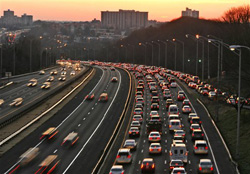Some states are assessing additional fees on electric vehicle owners that end up being in excess of what the average car owner pays in gas taxes, consumer advocates said Wednesday.
Consumer Reports found that 26 states (up from 17 a little more than a year ago) have implemented policies mandating additional registration fees for owners of electric vehicles.
Of those 26, 11 charge more than would be paid by the owner of a similar gasoline-burning car, CR found. Three states charge more than double the average paid in gasoline taxes by the owner of an equivalent ICE-powered vehicle. And one state, Missouri, is considering a proposal that would increase its existing fee to three times the average paid in gasoline tax.
According to CR, there are 12 additional states currently considering proposals to implement EV registration fees. Of those 12, 10 would charge fees above the average gasoline tax paid by drivers. Consumer advocates argue that those fees do little to contribute to road maintenance and other transportation projects, which is ostensibly the reason for implementing them.
"People should be allowed to choose a vehicle that’s safe, reliable, and better for the environment without being punished," said CR's Shannon Baker-Branstetter.

Traffic
One argument in favor for hedging high on EV registration fees is the fact that they tend to be heavier than gasoline-burning vehicles of the same size and passenger configuration, thus contributing more to roadway degradation. Robert Atkinson of the Information Technology and Innovation Foundation says that's a non-issue at the passenger vehicle level, and that additional fees should be assessed on heavy trucks, which do most of the damage and impact the environment in other ways that light-duty EVs do not.
The federal government assesses a heavy vehicle use tax on trucks with a gross taxable weight of 55,000 pounds or more. Since 1985, states have been responsible for collecting this tax, which is then redistributed by the federal government for the purposes of highway maintenance and construction.
The U.S. Chamber of Commerce has also publicly advocated for raising the federal gasoline tax, which has been set at 18.5 cents per gallon since 1993. The Chamber suggested a 25-cent increase, which would be 36 percent above the pace of inflation.












